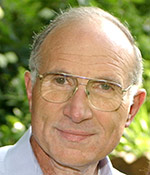Philip Needleman, PhD, former chair of the Department of Pharmacology at Washington University School of Medicine in St. Louis, has been elected a fellow of the American Academy of Arts and Sciences.
Needleman, whose history with Washington University has spanned five decades, is among 197 men and women elected this year by the academy. The organization was formed in 1870 to cultivate the arts and sciences and to recognize leadership in scholarship, business, the arts and public affairs.

“Phil Needleman is one of the world’s great scientific innovators and leaders,” said Chancellor Mark S. Wrighton. “He is also a great citizen of Washington University and a wise counselor as a member of our board of trustees.”
The academy’s current membership of more than 4,500 includes more than 150 Nobel laureates and 54 Pulitzer Prize winners. Fellows are selected through a highly competitive process that recognizes individuals who have made pre-eminent contributions to their disciplines and to society at large.
Needleman is being honored for discovering and developing Celebrex, a type of arthritis drug called a COX-2 inhibitor that treats the pain and inflammation of osteoarthritis and adult rheumatoid arthritis.
He began his long and distinguished career with the School of Medicine as a postdoctoral fellow in 1964. He became a professor in the Department of Pharmacology and then chaired the department from 1976-89.
He left the medical school in 1989 and, in a series of promotions, became senior executive vice president, chief scientific officer, and chairman of research and development at Pharmacia Corp. (formerly Monsanto/Searle), a position he held until 2003.
The next year, Needleman was named associate dean at the medical school and assisted with BioMed 21, the university’s innovative research initiative designed to speed scientific discovery and to rapidly apply breakthroughs to patient care.
An expert in prostaglandin regulation, Needleman and his colleagues in the School of Medicine made key discoveries about the roles of the COX-1 and COX-2 enzymes in the 1980s. Upon moving to Monsanto, Needleman led the development of the arthritis medication Celebrex, which is based on COX-2’s unique characteristics.
Needleman oversaw the complete path, from basic research to translational research and product development, for a drug now used by more than 30 million Americans.
As an adjunct professor of molecular biology and pharmacology and a member of the School of Medicine’s National Council, the university’s Board of Trustees and the Barnes-Jewish Hospital board, Needleman maintains close ties with the university.
He was elected to the National Academy of Sciences in 1987 and to the academy’s Institute of Medicine in 1993.
Needleman earned bachelor’s and master’s degrees in pharmacology from the Philadelphia College of Pharmacy and Science, and he earned a doctorate in pharmacology from the University of Maryland Medical School.